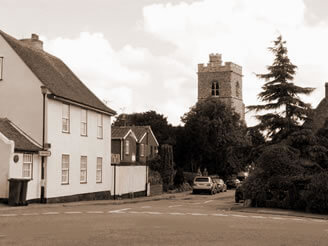Fob off
What's the meaning of the phrase 'Fob off'?
To put off deceitfully; to attempt to satisfy with something of inferior quality or something less than one has been led to expect.
What's the origin of the phrase 'Fob off'?
In 1990, Margaret Thatcher's government introduced the Community Charge in Britain. This highly unpopular tax, which was known colloquially as the Poll Tax, was firmly rejected by the British populace and initiated Thatcher's political demise. Step back 600 years to England's first Peasants' Revolt, also instigated by a clumsy attempt to install a Poll Tax by an unpopular government - the advisers of the 14-year-old King Richard II.
 On a pleasant May morning in 1381, the king's tax collector John Brampton rode into the Essex village of Fobbing to collect the poll tax of 3 groats from each of the local villagers. The villagers gathered together, Brampton was sent packing and the Peasants' Revolt had begun. Ask anyone in the village today and they will tell you that Brampton wasn't just turned away, he was 'fobbed off' - "...and that's how the expression 'fobbed off' originated".
On a pleasant May morning in 1381, the king's tax collector John Brampton rode into the Essex village of Fobbing to collect the poll tax of 3 groats from each of the local villagers. The villagers gathered together, Brampton was sent packing and the Peasants' Revolt had begun. Ask anyone in the village today and they will tell you that Brampton wasn't just turned away, he was 'fobbed off' - "...and that's how the expression 'fobbed off' originated".
As is often the case with phrases that a local tourist office would like to appropriate for their neighbourhood (like 'Paint the town red' for example), the link between the language and the place is spurious. Nice village it may be and the peasants there may be revolting, but 'fobbing off' has nothing to do with Fobbing.
'Fob' is known in English as a verb meaning 'to delude or impose upon' only since the 16th century - 200 years after Brampton was given the bum's rush out of Fobbing. The word is probably an import from Germany, where the earlier term 'foppen' has the same meaning.
The English playwright Robert Greene used the term in the romantic prose poem Mamillia, a mirrour or looking glasse for the ladies of England, 1583:
I will not... fobbe you with fayre wordes, and foule deedes.
Greene is best known as a contributor to the pamphlet A Groats-Worth of Wit, which is widely interpreted as an attack on Shakespeare. Nevertheless, Shakespeare was happy to pick up 'fobbed' (as 'fubd' in his original manuscript) and used it in a speech by Mistress Quickly in Henry IV Part II:
I have borne, and borne, and borne, and have been fubbed off, and fubbed off, and fubbed off, from this day to that day, that it is a shame to be thought on.
So, if you want phrase derivations we are here for you, don't be fobbed off with tour guide stories.

